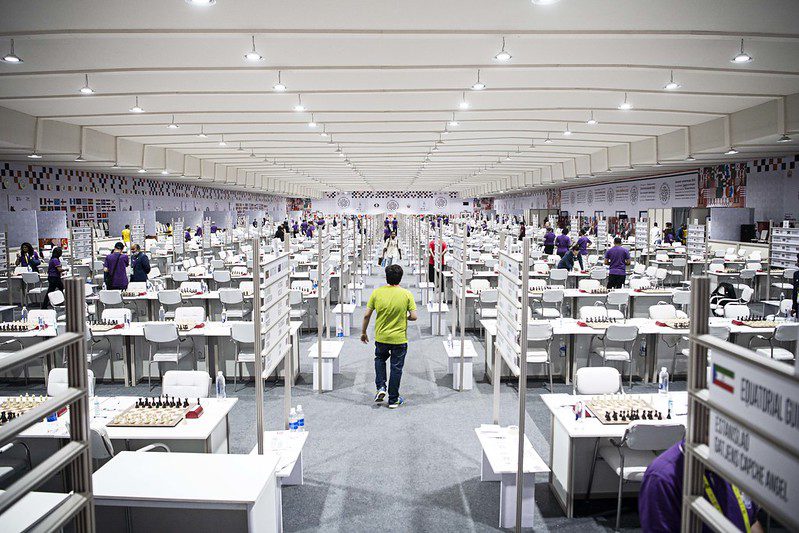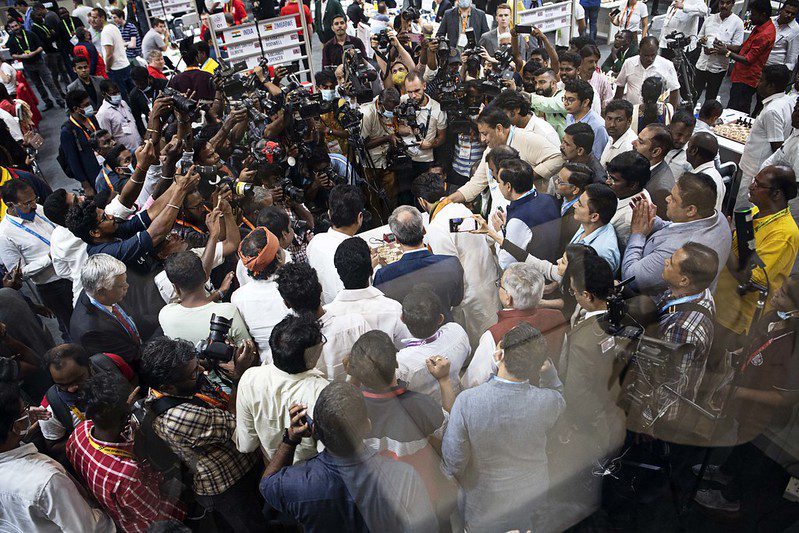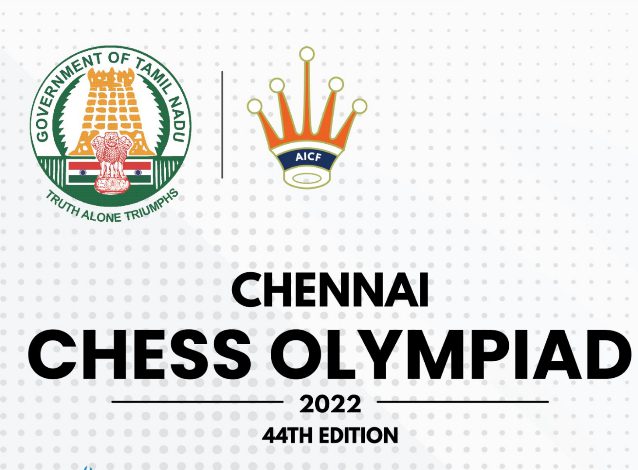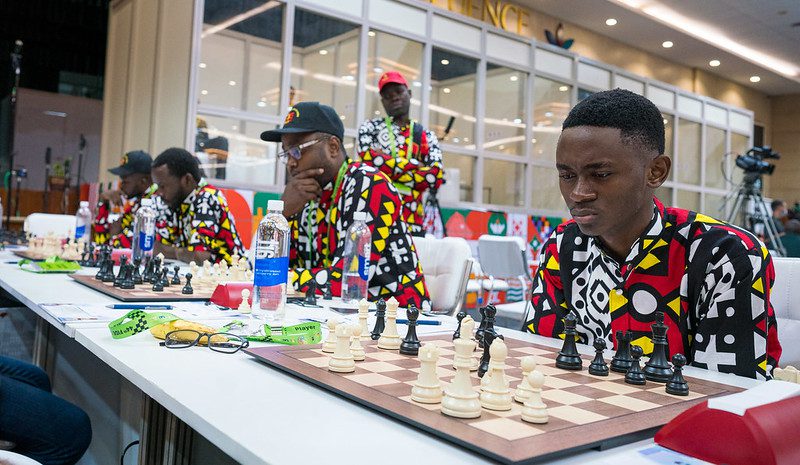2022 Chess Olympiad: Round #1

LET THE GAMES BEGIN!

The top board (Zimbabwe-India) was surrounded by dignitaries and a sea of photographers
as they await the ceremonial move.
Photos by Stev Bonhage.

2022 Chess Olympiad: Round #1
Friday, 29 July 2022
In the first round, IM David Silva of Angola was on the verge of the biggest upset in African history. He was up against Levon Aronian, the Armenian Grandmaster who famously switched federations to represent the U.S.A. Aronian’s American debut will not be a memorable one. In the end, he had to take a draw in a completely losing position. This can be considered an “upset” of sorts, but Africans are looking for more.

Angola was all the rave with their beautiful shirts against the U.S.
Photo by Lennart Ootes
Maria Emelianova of chess.com made an interesting observation:
The only time in history of chess @LevAronian is dressed boring comparing to his opponent ?#ChessOlympiad2022 #ChennaiChessOlympiad pic.twitter.com/NuR4MYRZkv
— Maria Emelianova (@photochess) July 29, 2022
Most will understand that Aronian has a penchant for garish outfits and has an adventurous taste in fashion. In fact, one wonders if Aronian offered a jersey swap after the game! Nevertheless, this game almost ruined his debut. There is still something strange about seeing Aronian and Leinier Dominguez playing for the U.S. Anyway…
The game started in a Rossolimo Sicilian but took a weird turn with white’s maneuver of 5.Bd3 and 6.Bc2. On move 18, white played Bd5 and Aronian uncorked 18…Rxd5!? which equalized. The idea is to get pressure on the diagonal and prepare f5. There were mistakes exchanged in the middlegame and white held the advantage until the end. In fact, when a draw was agreed white was +3. This led many to wonder why Silva settled for a draw.

After 42…Bf8, Silva offered a draw here with a decisive advantage.
Longtime national player for Angola, International Master Eugenio Campos wrote a very eloquent post on his Facebook page about the game and perhaps why Silva offered a draw. The was reason was that since Angola was already losing 3-0, then he agreed to a draw after they reached move 42.
Being a team competition, when the compatriots, Master Fide Domingos Junior, on the first board, Wanderson Dias, second, and MI Sérgio Miguel, third already had the defeat as inevitable, MI David Silva accepted the draw, as the point of honour for Angola, although it was in a winning position.
The Grand Master, in the “post-mortem” analyses, said he did not believe that David Silva’s link was only 2315, since he showed much more, something that is understandable because Angolans play few international tournaments with quality to evolve.~IM Eugenio Campos on Silva-Aronian
Let’s take a look:
Any More Upsets?
During an Olympiad tournament, the story of the first round is generally about individual upsets. Since the favorites are expected to go 4-0 then there is nothing to report. However, most Olympiads usually have a story of a 300-400 point scalp by some obscure player in a country where tournaments are few.
At the 2016 Chess Olympiad, Sudan actually had a team upset as the African nation held Bulgaria to a 2-2 draw. The first board saw the Sudanese player FM Abubaker Tagelsir (2216) brutally checkmate Bulgarian Grandmaster Momchil Nikolov (2585). In more recent years, teams from smaller nations have been taking points from strong players. There was one prominent error on chess24 that had Emar Edwards of Barbados (1928) beating GM Jonathan Westerberg of Sweden (2476). Apparently, the lower boards were mixed up. FM Malaku Lorne of Jamaica (2079) played to a draw with GM Maxime LaGarde (2631)!
I’m feeling good! Let’s go!!! https://t.co/4awHjsqbKI
— Mala @ Olympiad in Chennai, India (@MalaLorne) July 29, 2022

Anthony Drayton of Guyana
Favorites go through... most of them

Cynthia Awino Obondo of Kenya scored a 700-point upset
Photo by James Mwangi
Apart from the few upsets, much of the first round went as expected. The women’s section had a couple of rating upsets including Cynthia Obondo from Kenya (1439) defeating Alessia-Mihaela Ciolacu from Romania (2163). That is more than 700 Elo points! How does something like this happen? In Africa, there are few international tournaments, so ratings are often depressed. There is no pool of strong players to get rating points from. At the Olympiad, you will see players from small nations feasting on highly-fancied opponents.

Full Broadcast (06:01:28)
Video by FIDE